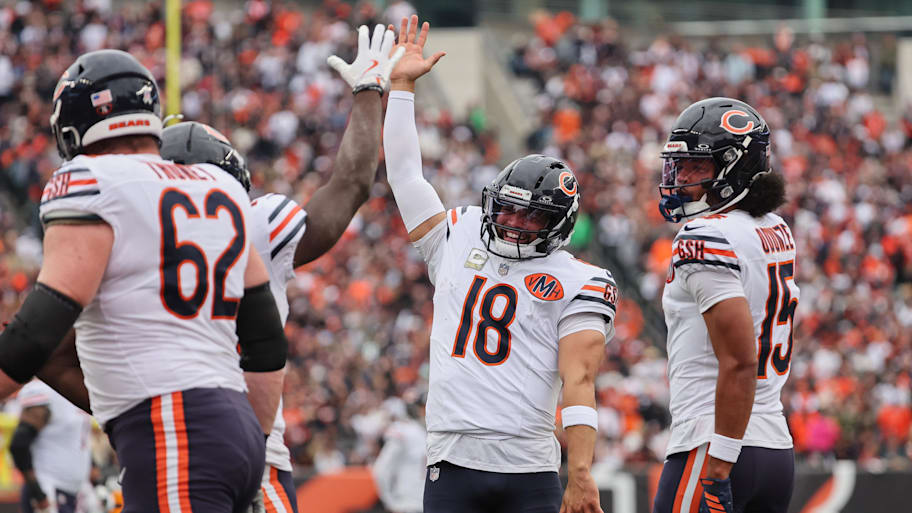
While the Zac Taylor Bengals without Joe Burrow are taking on their own demonic narrative, powered by a series of unfathomable collapses in consecutive weeks—who knew that blaming your troubles on Lou Anarumo, consistently one of the best defensive coordinators in the NFL, would backfire so spectacularly?—we want to point your attention to the fact that a crateload of cosmically strange occurrences for one football game lined up against the Bears on Sunday, and Chicago walked away with a victory anyway.
Talk about burying demonic narratives. We can, and will, discuss how Ben Johnson has spearheaded this complete cultural turnaround. We can, and will, discuss how Caleb Williams seems to have found this beautiful middle ground between living in the abstract and making Lamar Jackson–esque reads that only he seems capable of seeing. But as basic as this seems to point out, it warrants mentioning that this is precisely the kind of game that Chicago has been known to lose, and that finding a way to come back with seconds remaining to beat the Bengals 47–42 on a ridiculous 58-yard Colston Loveland touchdown is nearly as important as all the foundational work that has put Chicago in this position to begin with. This isn’t fan drivel. Last season literally collapsed underneath the weight of one of these losses. Many seasons have collapsed under the weight of these losses. What a fanbase thinks of itself and, consequently, what a team thinks of itself, absolutely matters.
In another era, had you told a Bears fan who missed the game that Chicago had given up an onside kick—current chances of recovering an onside kick are roughly 4.7%—and surrendered a game-opening kickoff return touchdown, would they have even bothered to ask what the final score was?
The Bears have scored at least three touchdowns in all but one of their games. Before last week’s loss to Baltimore, Chicago was the lone remaining team to have logged at least 21 points in every week of the NFL season. On Sunday against the Bengals, the Bears logged more total yards of offense (576) than they had in any game since 1980. It was their sixth-highest output since they became the Chicago Bears in 1922. Caleb Williams had a quarterback rating of more than 120, with no interceptions and three touchdowns on the downs in which the Bears were trailing.
This isn’t just a context-free stitching of glamour stats to prove a point. This is evidence of a tidal shift in the competency of an offense and, because of that, the materialization of a team that, while on the road, having just been kicked in the midsection by a gutting mistake, can entrust its young quarterback to drop a ball into the middle of three defenders to a rookie tight end and have him bounce his way into the end zone.
I would guarantee that, if you remove the teams that are operating with an alien-bodied, game-altering quarterback who can transcend scheme—aka the Ravens, Bills and Chiefs—Johnson is likely behind only Sean McVay at the moment in terms of consistently feared offensive coaches. And this system will spread like an invasive plant as teams try to play Whac-A-Mole in an effort to stop it.
If Sunday’s game hasn’t driven home the Ben Johnson effect, I’m not sure what will. Even the most banal plays that gain a handful of yards are a clinic in the ways he can complicate life for a defense. Nearly every player trying to digest what Johnson is doing presnap is conflicted, with an action pulling him away from where he’s supposed to be and a corresponding action placing a receiver wide open with room to run. Johnson was able to see advantages in Detroit—for example, the way he would use the stiff-ish Jared Goff’s mobility as a weapon or offensive linemen as point-scoring chess pieces—and has brought that same approach to Chicago.
Getting Williams a pair of receptions Sunday (one for a touchdown) was not superfluous, either. While his version of the Philly Special on fourth-and-goal in the first quarter was masterful—albeit less original looking than his Tyson Bagent–Williams cross-field throwback that netted 20 yards—it underlines Johnson’s ethos as a play-caller. He hunts. While in Detroit, his trick plays alone had a staggering EPA, bringing the Lions nearly an expected point per trick play call. Not only do they work, but they add in so many complicating, deleterious effects for a defense. Coordinators are more wary of being embarrassed. Corners and linebackers are forced to consider, just for a second, the possibility that something truly strange might soon occur.
And because of that, Johnson’s offense is playing with a near-constant upper hand, even, as we saw on Sunday, in moments when the Bears are trailing.
As the NFC North starts to congeal—the Packers lost to the Panthers on Sunday and the Lions fell to the Vikings—Chicago has the greatest potential right now to totally upend the division. Though only a game better than they were at this point a year ago, just as Chicago was dealing with the aftermath of the Hail Mary loss to the Commanders, the actual space between then and now is harder to calculate, just like all those win probability stats Sunday that told you Chicago had no chance of defeating the Bengals. Just like all those weeks you would have assumed it was already over.
More NFL From Sports Illustrated
This article was originally published on www.si.com as Bears’ Thrilling Win Over Bengals Was Proof of the Ben Johnson Effect.







